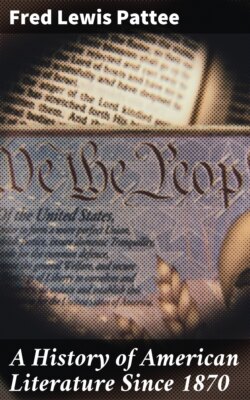Читать книгу A History of American Literature Since 1870 - Fred Lewis Pattee - Страница 27
На сайте Литреса книга снята с продажи.
IV
ОглавлениеTable of Contents
It has been customary in libraries to place the earlier works of Mark Twain on the same shelf as those of Artemus Ward and Josh Billings. To the thousands who laughed at him as he lectured from year to year he was a mere maker of fun. The public that bought such enormous editions of The Innocents Abroad and Roughing It bought them as books to laugh over. What shall we say to-day of Mark Twain's humor? A generation has arisen to whom he is but a tradition and a set of books; what is the verdict of this generation?
First of all, it is necessary that we examine the man himself. Nature seems to have forced him into the ranks of the comedians. From his mother he inherited a drawl that was inexpressibly funny; he had a laughable personality, and a laughable angle from which he looked at life. He could no more help provoking mirth than he could help being himself. Moreover, he had been thrown during his formative years into a veritable training school for humorists. On the river and in the mines and the raw towns and cities of the West, he had lived in a gale of high spirits, of loud laughter, of practical jokes, and droll stories that had gone the rough round of the boats or the camps. His humor, therefore, was an echo of the laughter of elemental men who have been flung into conditions full of incongruities and strange contrasts. It is the humor of exaggeration run wild, of youthful high spirits, of rough practical jokes, of understatement, of irreverence, and gross absurdity.
But the personality of Mark Twain no longer can give life to his humor; the atmosphere in which it first appeared has gone forever; the man himself is becoming a mere legend, shadowy and more and more distorted; his humor must be judged now like that of Cervantes and Shakespeare, apart from author and times. How does it stand the test? Not at all well. There are the high spirits of the new West in it—that element has not evaporated—and there is in it a personal touch, a drollery that was his individual contribution to humor. There was a certain drawl in his pen as well as in his tongue. It is this alone that saves much of his humorous work from flatness. Concerning The Jumping Frog, for instance, Haweis asks in true British way, "What, I should like to know, is the fun of saying that a frog who has been caused to swallow a quantity of shot cannot jump so high as he could before?" The answer is that there is no fun save in the way the story is told; in other words, save in the incomparable drawl of Mark Twain's pen. One can only illustrate:
The feller … give it back to Smiley, and says, very deliberate, "Well, I don't see no pints about that frog that's any better'n any other frog."
"May be you don't," Smiley says. "May be you understand frogs, and may be you don't understand 'em; may be you've had experience, and may be you ain't, only a amature, as it were. Any ways I've got my opinion, and I'll risk forty dollars that he can out-jump any frog in Calaveras county."
And the feller studied a minute, and then says, kinder sad like, "Well, I'm only a stranger here, and I ain't got no frog; but if I had a frog, I'd bet you!"
Or take this episode from The Innocents Abroad where he tells of his sensations one night as a boy upon awakening and finding the body of a murdered man on the floor of his room:
I went away from there. I do not say that I went away in any sort of a hurry, but I simply went—that is sufficient. I went out at the window, and I carried the sash along with me. I did not need the sash, but it was handier to take it than it was to leave it, and so I took it. I was not scared, but I was considerably agitated.
All this and the hundreds of pages like it in The Innocents Abroad and Roughing It and the later books is excellent drollery, but had Mark Twain written nothing else than this he would be as dead now as an author as even "Doesticks." His drollery is best in the work that lies nearest to the source of his first inspiration. As the Western days faded from his memory, his comedy became more and more forced, until it could reach at last the inane flatness of Adam's Diary and flatter still, Eve's Diary.
The humor that lives, however, is not drollery; it must be embodied in a humorous character like Falstaff, for instance, or Don Quixote. The most of Mark Twain's fun comes from exaggerated situations with no attempt at characterization, and therein lies his weakness as a humorist. Huckleberry Finn and Colonel Sellers come the nearest to being humorous creations, but Huckleberry Finn is but a bit of genre, the eternal bad boy in a Pike County costume, and Colonel Sellers is but a preliminary study toward a character, a shadowy figure that we feel constantly to be on the point of jumping into greatness without ever actually arriving. Narrowly as he may have missed the mark in these two characters, Mark Twain cannot be classed with the great humorists.
